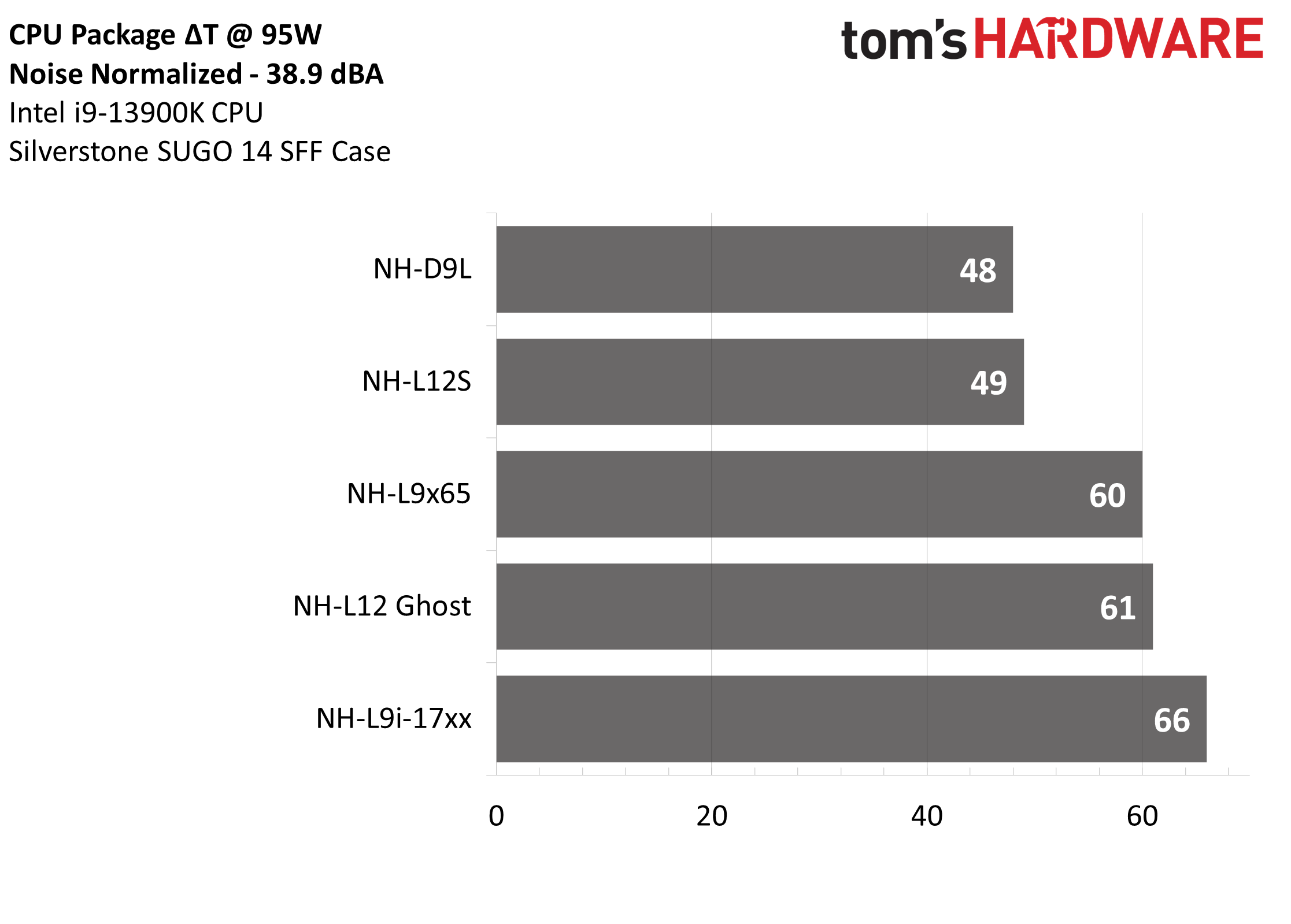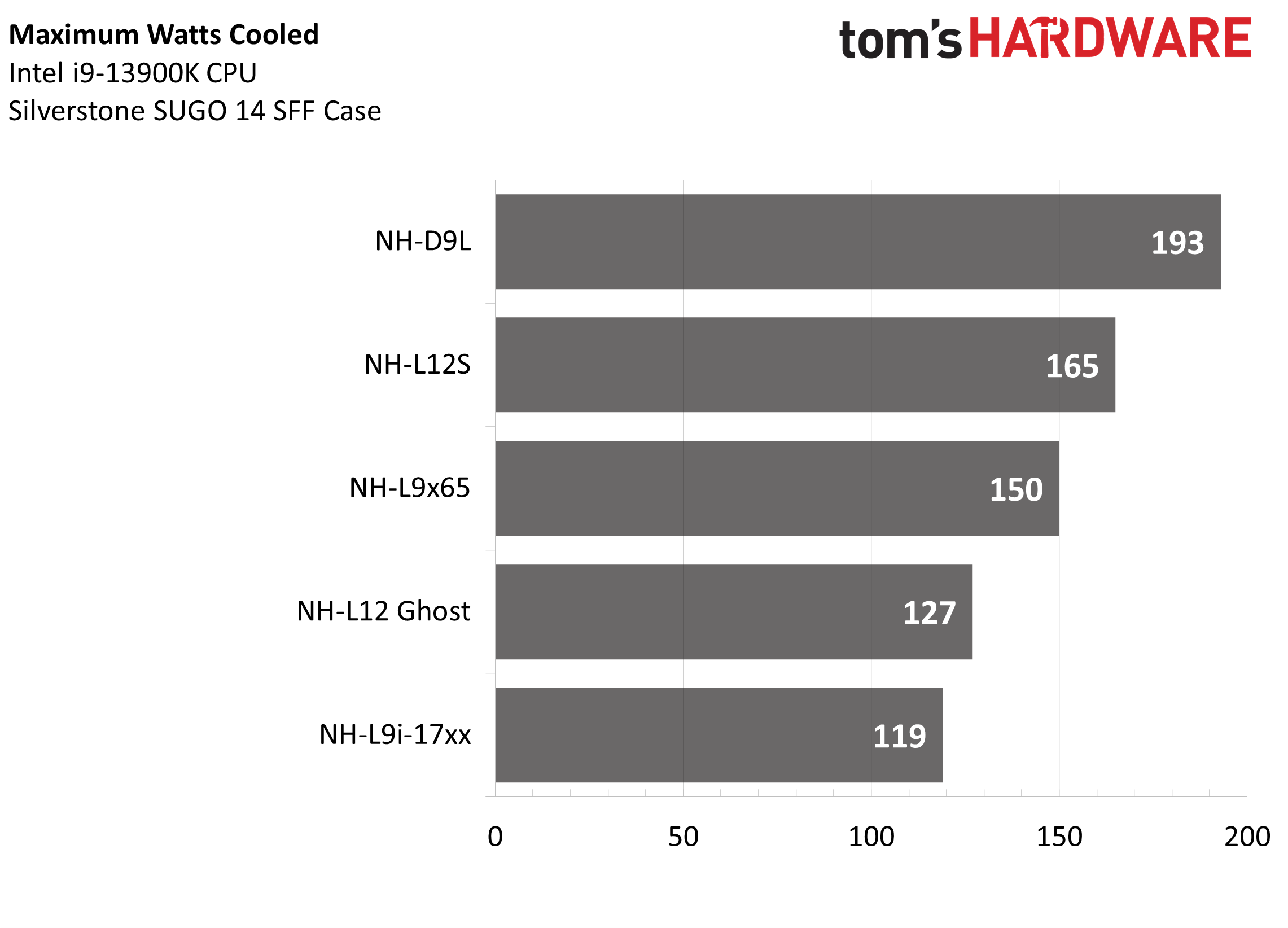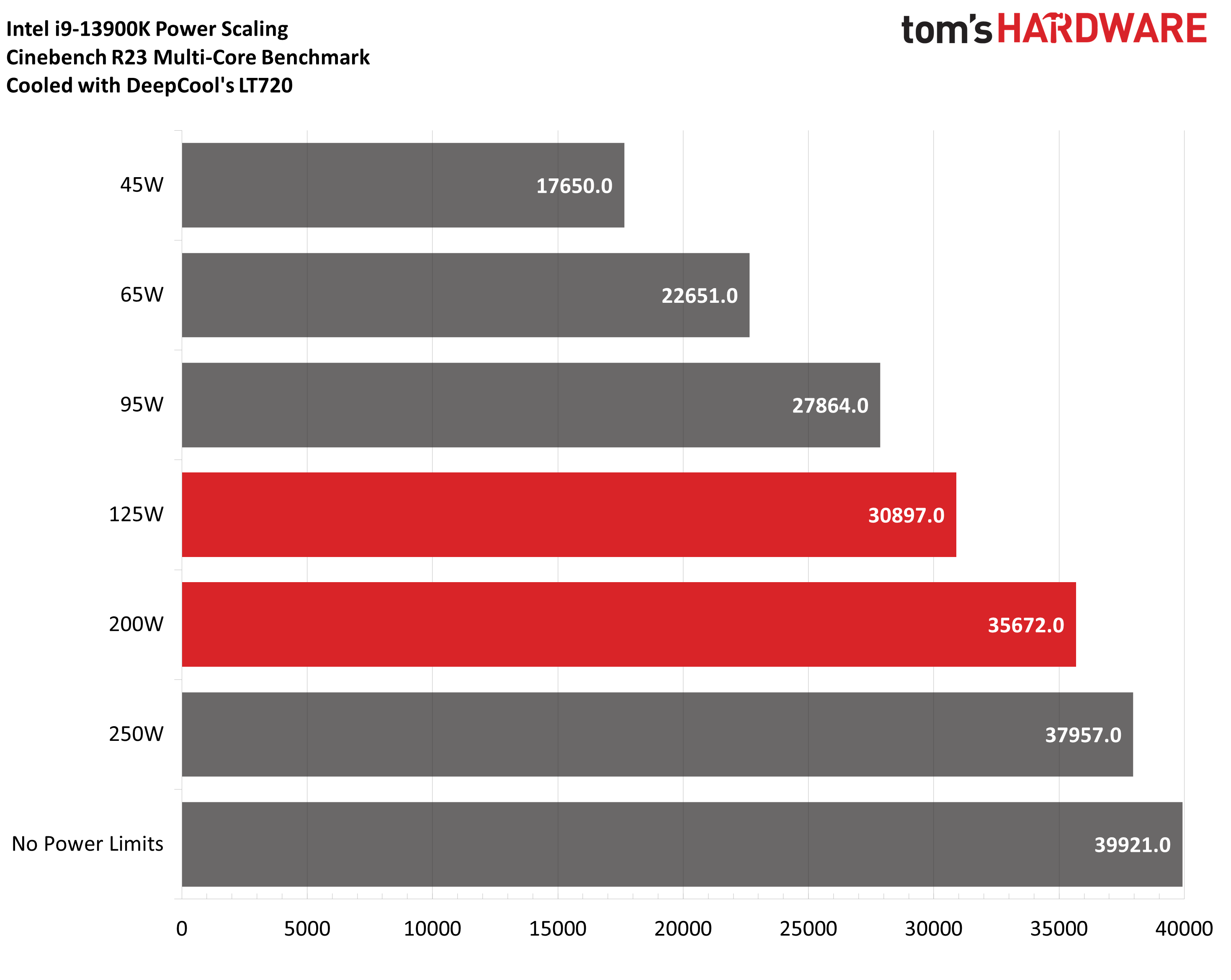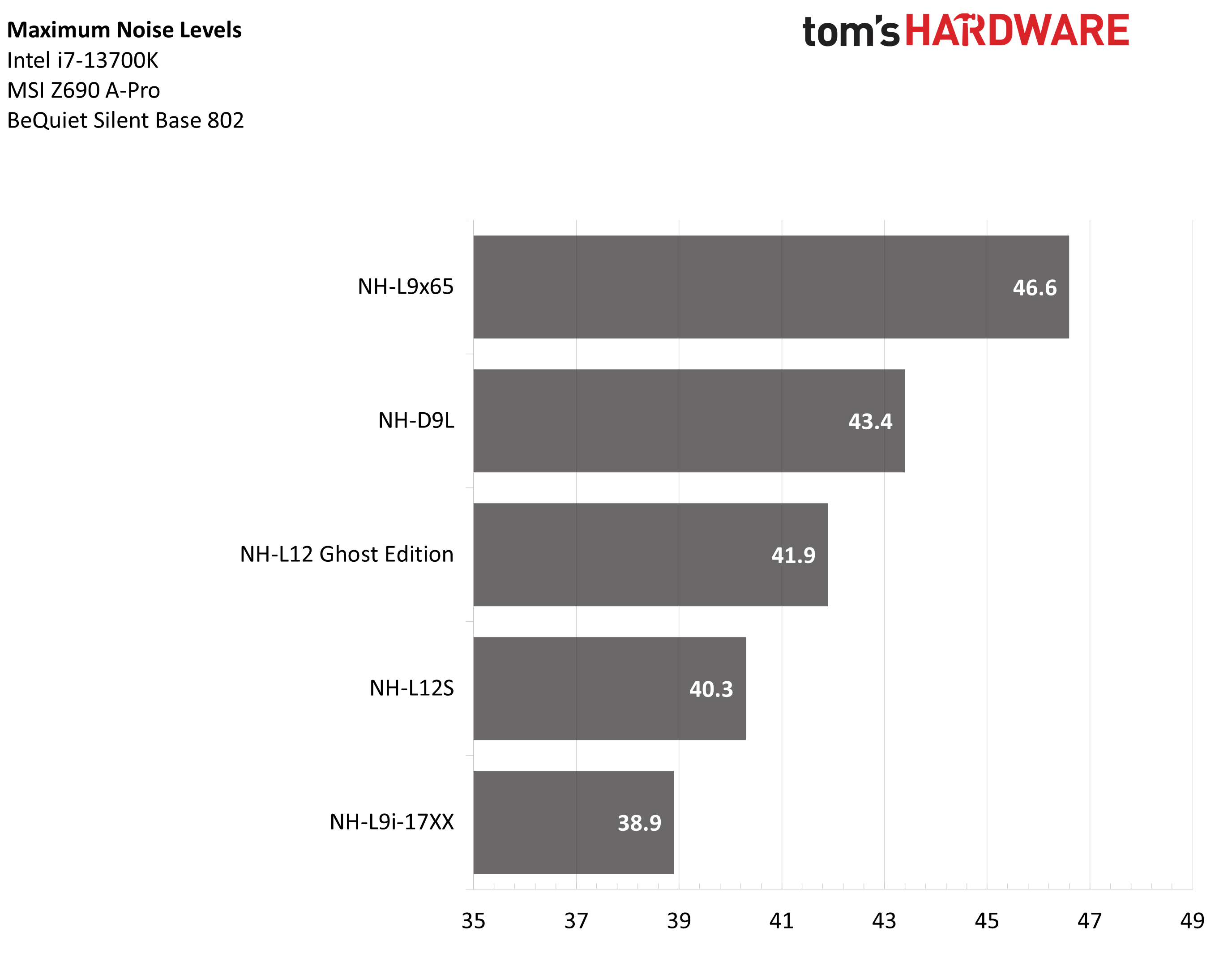Noctua SFF Cooler Roundup: Testing Small Coolers Against Intel’s Core i9-13900K
How much (or how little) heat can SFF coolers handle?
Noise Normalized results
Finding the right balance between fan noise levels and cooling performance is important. While running fans at full speed can improve cooling capacity to some extent, the benefits are usually limited and most users prefer a quiet system.
For our SFF noise normalized tests, Acoustics were limited to 38.9 dBA. This level of noise is a low, but slightly audible, volume level. The NH-D9L and the NH-L12S did very well here, with CPU temperatures of 71-72C degrees.
You might notice that in addition to normalizing the noise levels, I also limited the power levels. I had originally planned to run this test without power limits, but the Gigabyte motherboard used for this testing forces fans to run at full speed when the CPU reaches TJMax. To get around this inconvenience, I limited the CPU power consumption. I was forced to use a lower limit of 95W because the L9i-17xx will reach TJMax in hotter workloads.
Full Power Thermal Results
Even with full-size CPU air coolers, Intel’s i9-13900K will hit its peak temperature and thermally throttle to some extent. In this test, we measure the total amount of watts the cooler is able to dissipate from the CPU.
As these are smaller-sized coolers, I didn’t expect them to handle a maximum-watt load. That said, I was very impressed with the performance of the NH-D9L here. Cooling 193W means that in most common scenarios, you won’t see any performance loss when using Intel’s i9-13900K.
There will be some performance loss compared to a cooler that can handle the full heat of Intel’s i9-13900K, but it’s not as much as you might think. I’ve previously tested power scaling on my personal blog, shown below, to see just how much power Intel’s i9-13900K really needs.
The NH-D9L’s performance will be similar to my results with a 200W power limit enforced, where only an 11% performance loss was observed, compared to running the CPU without power limits. The L9i-17xx’s performance will be similar to my results with a 125W power limit, which resulted in a 23% performance loss.
Get Tom's Hardware's best news and in-depth reviews, straight to your inbox.
Maximum Noise Levels
While most of the coolers run fairly quietly, the NH-L9x65’s volume is notable at 46.6 dBA. I generally prefer coolers to run at 43dBA or lower. Depending on your comfort levels, you may consider this a loud noise level. But I do think 46.6dBA is tolerable.
Conclusion
While you can’t expect cooling performance comparable to full-size desktops, Noctua has an SFF cooler that will fit your PC form factor no matter how small of a space you’re working with. And despite encountering compatibility issues with multiple SFF coolers from competing coolers, each of Noctua’s offerings fit our SFF testing rig with no problems and provided adequate cooling dissipation.
While all the coolers we tested here were able to handle Intel’s Core i9-13900K to some degree, you’ll probably want to stick with lower-end CPUs if opting for more compact coolers. Because even if your cooler can technically move a high amount of heat away from your CPU, that heat still needs to escape from your case quickly, or it’s just going to be heating up your other components. And if your case requires one of the smallest SFF coolers, there’s a good chance its internal airflow is also likely to be limited compared to larger cases.

Albert Thomas is a contributor for Tom’s Hardware, primarily covering CPU cooling reviews.
-
Amdlova Wow great review :) too many noctuas in one review.Reply
You can test the thermalright coolers cheap as he'll
Thanks man! -
edzieba ReplyWhile all the coolers we tested here were able to handle Intel’s Core i9-13900K to some degree, you’ll probably want to stick with lower-end CPUs if opting for more compact coolers. Because even if your cooler can technically move a high amount of heat away from your CPU, that heat still needs to escape from your case quickly, or it’s just going to be heating up your other components. And if your case requires one of the smallest SFF coolers, there’s a good chance its internal airflow is also likely to be limited compared to larger cases.
With the exception of 'fashion' cases (e.g. acrylic cubes or designs intended to hide all ventilation behind cosmetic panels) an SFF case will usually fare far better than a full size case here. When you have such a tiny volume of air to vent and such small distances between component fan and external intake, case volume changes per minute can be pretty ludicrous. On top of that, intake ducting can net you some serious thermal benefits for very little by turning every component fan into a direct intake with no recirculation, effectively matching performance with an open-air test rig. -
Phaaze88 Reply
This could be Thermalright's fault more than the reviewer's, so perhaps the pitchforks and torches should be raised at them instead?Amdlova said:You can test the thermalright coolers cheap as he'll
If requested, I'm sure Noctua has no problem sending out review samples.
As for Thermalright, I'm not sure what they're doing, but it may be connected to the lack of available reviews in english: https://www.techpowerup.com/reviewdb/CPU-Coolers/Air/Thermalright/
Plus, if a reviewer has to purchase a sample with their own cash, they'll be less likely to do it, especially when other samples are on the way, or in their hands already. -
Albert.Thomas No pitchforks needed, folks. I do have contacts with Thermalright, I actually just finished their Phantom Spirit 120 on my Ryzen system, but there's only so much I can cram into a single review.Reply
I might look at SFF again in the future, but I don't want to continue to try working with the motherboard I have on hand with it's extra tall heatsinks - too many compatibility issues. If I do, I'll probably use my 7700X instead of the i9-13900K, any recommendations for AM5 mITX motherboards? -
Phaaze88 Reply
Hey, good to hear!Albert.Thomas said:No pitchforks needed, folks. I do have contacts with Thermalright, I actually just finished their Phantom Spirit 120 on my Ryzen system, but there's only so much I can cram into a single review.
Toms and TPU are 2 sites I frequent, and there would be at least one comment in the cooler reviews requesting more Thermalright, as well in Youtube comments.
I wish they had a larger presence in the US. Their availability and support is not quite there yet.
Only available through Amazon and Newegg now; other sites have dropped off the radar.
Thermalright Direct 1/2/3 is the seller. That may have changed since the last time I looked through.
If the packaging doesn't come with the bracket you need for a cpu, can you request the correct one shipped to you free of charge, or will you be directed to purchase it instead? -
Giroro For what it is, I like the NH-L9x65. But it should be priced below $30, not $60.Reply
Once you're in the $60+ price range, a small AIO is going to be a better choice for most people. -
helper800 Reply
ITX boards all tend to have tall surrounding heatsinks. If I had to pick one ITX board, maybe the Gigabyte B650 Ultra. It seems like a decent board, but I don't know if you need any of the extras that come with the X670E, or the B650E boards.Albert.Thomas said:I might look at SFF again in the future, but I don't want to continue to try working with the motherboard I have on hand with it's extra tall heatsinks - too many compatibility issues. If I do, I'll probably use my 7700X instead of the i9-13900K, any recommendations for AM5 mITX motherboards? -
bit_user Thanks for the roundup! I know it's on the larger side, but I think it would've been nice to include the NH-C14S as it would round out their selection of down-draft coolers. Plus, the height isn't so bad, if you mount the fan underneath - only 5 mm taller than the NH-D9L!Reply
https://noctua.at/en/products/cpu-cooler-retail/nh-c14s
I'm personally very interested in it. -
greenreaper Noctua has the NA-FD1 as well to provide a custom-sized duct to a mesh case intake - in my experience it was good for another 5-10 W of cooling on a 7600 in a Chopin Max case.Reply
They will even send you some bolt extenders if you want to put a bigger 25mm fan on the cooler with the duct (though I suspect it also has to be about as fast RPM-wise to gain any benefit).
I put another fan outside the mesh pointing into the duct to raise the main fan RPM for another ~5 W. -
Amdlova The noctua thing is made for enthusiasts people who love to hear the butterflies. Thermalright in other hand will attract the people who wants build the first PC cheap build... (new public to the site). Easy to find a thetmaltight on sub 500 build than a noctua one grand build. (Yeah and pitchfork the thermalright (where is the new ultra 120 extreme cooper edition)Reply



